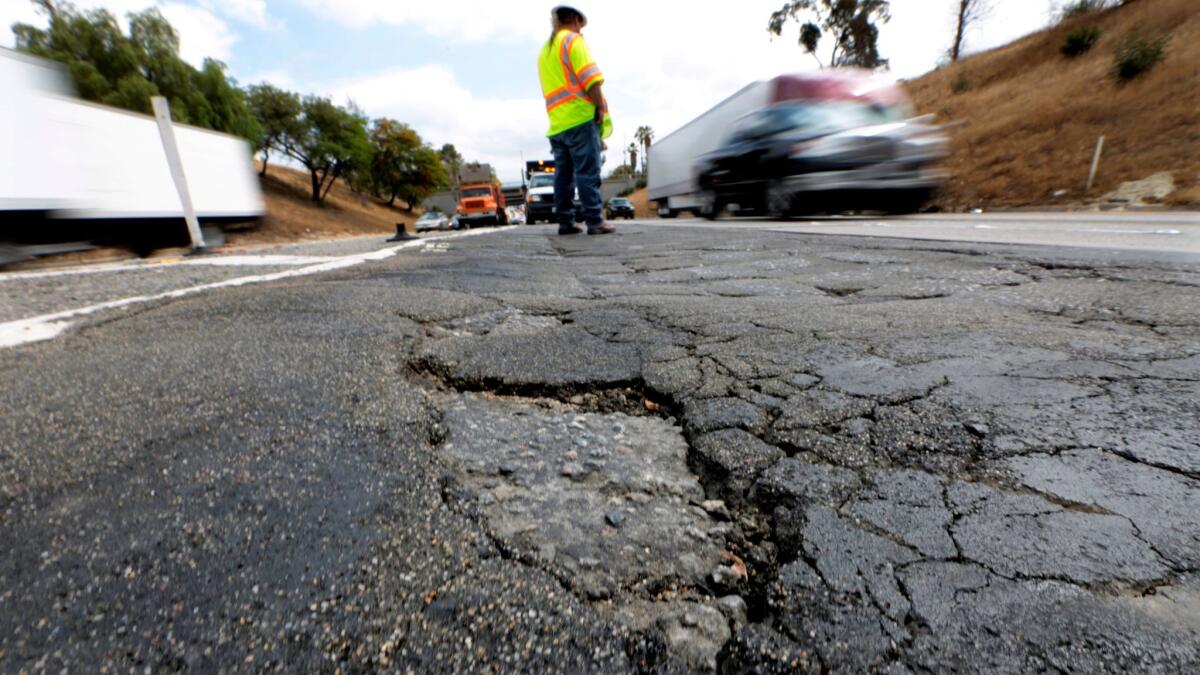Editorial: California plans to fix its transportation infrastructure by selling out its clean air to the trucking industry

- Share via
If the transportation funding proposal unveiled this week by Gov. Jerry Brown and state legislative leaders simply contained the gas tax hikes and vehicle fees outlined in their press releases and statements, then of course lawmakers should support the proposal. The state’s infrastructure needs far outpace the revenue collected in fuel taxes, which California has relied on for decades to pay for road repairs. More fuel efficient and electric vehicles on the road have reduced gas tax revenue has well. To close the gap, the common-sense proposal outlined by state leaders would raise fuel taxes and levy a new “road user fee” on drivers to pay for vital transportation infrastructure.
But the press releases and political speeches did not mention that the bill contains an unusual change from the leaders’ previous proposal. Added at the last minute at the trucking industry’s behest, it would block regulations that would force truck owners to upgrade to less polluting models. The addition says that regulators cannot directly or indirectly require owners to retire, replace, retrofit or repower their trucks within 13 years of the model year or when the vehicle hits 800,000 miles.
That amendment is a big concern in Southern California, where diesel-fueled big rigs are the region’s top source of smog-forming emissions. Regulators are trying to dramatically cut pollution from trucks that serve the region’s growing warehouse and distribution industry. The amendment also could make it harder for the ports of Los Angeles and Long Beach — the largest single source of air pollution in the region — to move to a zero-emission truck fleet.
It’s too bad that the bill’s backers agreed to slip a poison pill into an otherwise strong proposal
California Air Resources Board Chairwoman Mary Nichols defended the change, saying she didn’t believe it would prevent Southern California regulators from developing rules to limit diesel pollution at warehouses. Environmental groups don’t buy it. They argue the provision is so broad that it could block the development of so-called indirect source rules that cap pollution at warehouses and indirectly force truck owners to switch to cleaner equipment.
Sacramento insiders argue that the provision is just part of the inevitable horse trading required to get the two-thirds vote in the Legislature needed to pass a tax increase. Perhaps. But this is not a little extra funding for someone’s pet project. This is a policy that could tie regulators’ hands and make it harder to clean up polluted air.
It’s too bad that the bill’s backers agreed to slip a poison pill into an otherwise strong proposal. There’s a lot to like in the road funding bill. California has consistently failed to spend the money needed to keep the state’s transportation infrastructure in good condition. Caltrans has deferred $59 billion worth of highway and bridge repairs. Cities and counties face an even bigger bill, needing $78 billion to return local streets to good condition. The state currently spends about $1.2 billion a year highways and bridges, but it should be spending $800 million more each year just to stay current on the maintenance. Part of the problem is that the fuel taxes haven’t increased with inflation and, at same time, more fuel-efficient vehicles have allowed drivers to pick up less of the cost of maintaining the roads their vehicles wear down.
This bill would raise the gas excise tax by 12 cents — a 43% bump — and it would increase the diesel sales tax and hike the diesel excise tax by 20 cents, with future increases pegged to inflation. The bill would add a new road user fee ranging from $25 to $175 based on the value of the vehicle. Starting in 2020, electric vehicle owners, who don’t pay the gas tax, would be charged a $100 fee, so the funds don’t dry up as more drivers switch to electric cars.
The proposal would generate $52.4 billion over 10 years. Almost two-thirds of the money would be spent fixing existing roads, highways, bridges and other road infrastructure, which makes sense; this work only grows more expensive as time passes and deterioration increases.
The Brown administration has said that this funding proposal aligns with the state’s environmental and climate change goals. It dramatically increases funding for transit, bike and pedestrian projects compared to past transportation funding measures and prioritizes maintenance over new highways. That’s good policy that makes wise investments in California’s future. So why would the governor and legislative leaders sully that ambitious agenda with an amendment that could hinder Southern California’s effort to clean the air?
Follow the Opinion section on Twitter @latimesopinion and Facebook
More to Read
A cure for the common opinion
Get thought-provoking perspectives with our weekly newsletter.
You may occasionally receive promotional content from the Los Angeles Times.






